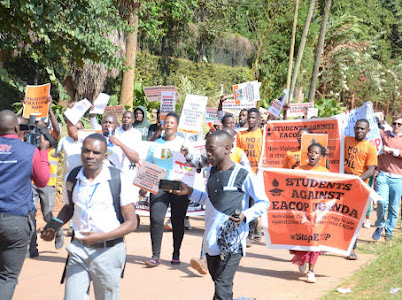Kampala, Uganda – Hundreds of people gathered outside Chinese embassies and financial institutions in 10 countries today – with another action expected to take place on the 28th in Washington DC – calling on China to reject financial support for the East African Crude Oil Pipeline (EACOP) and related oil field projects. The demonstrations took place across Africa and Europe in a coordinated day of action organized by Ugandan, Tanzanian and other StopEACOP campaign members.
In Uganda, 30 activists were arrested, underscoring the escalating repression faced by those opposing the EACOP project. In Tanzania, police took the banners protesters were holding and took photographed pictures of the project-affected people shown on the banners with their testimonies, raising concerns that those individuals could face future harassment by security forces.
This follows the arrest of 7 activists on May 27th during another protest outside the Chinese embassy in Uganda. Additionally, the recent abduction of Stephen Kwikiriza and the ongoingharassment and intimidation of numerous other defenders highlight the severe and persistent threats faced by those who courageously stand against EACOP. These actions represent a blatant violation of human rights and an attempt to silence the voices of those advocating for environmental justice and the protection of affected communities who have even fewer safe channels to speak up.
This was the third time local civil society groups in Uganda and Tanzania working with project-affected people tried to bring their messages to the Chinese embassies through peaceful demonstrations. Civil society and community-based organisations in the Democratic Republic of the Congo, Nigeria and South Africa joined their effort and took to the streets calling on China not to perpetuate and reproduce the exploitation and damage caused by the fossil fuel industry and instead realign its developmental approach to the continent with the aspirations and needs of the African people. Global groups in Europe also showed solidarity by demonstrating outside the Chinese embassies and consulates in their respective countries, carrying letters from affected people and civil society in Uganda and Tanzania. Cities involved included Paris, France, where demonstrators constructed a model pipeline spilling a black oil-like substance in front of the embassy entrance; London and Manchester, UK; The Hague, Netherlands; Düsseldorf, Germany; and Copenhagen, Denmark. In addition, activists from the Ugandan Diaspora in the US plan to take action in Washington, DC, on June 28th.
People participating in the global actions are specifically urging the Chinese state-owned financial institutions, including the China Export & Credit Insurance Corporation (SINOSURE), the Export-Import Bank of China (China Exim Bank), and the Industrial and Commercial Bank of China (ICBC), to make sound decisions. The Ugandan government has claimed that these institutions are considering supporting the EACOP projects with a decision expected by June, but they are reportedlytaking a prolonged time to assess the outstanding risks.
Participants in the action requested the Chinese embassies to share a range of materials with relevant Chinese decision-makers. The materials they brought with them to deliver to embassy officials include two petitions signed by 2,591 and 2,461 oil project-affected individuals in Uganda, as well as studies by Ugandan and international organizations detailing the projects’ impacts. The actions were also intended to show solidarity with local activists and human rights defenders in Uganda and Tanzania who have faced repression for opposing the EACOP.
All of the Chinese embassies, except for the one in Tanzania, refused to meet with the protestors or receive the materials. The embassy in Tanzania briefly met with the action representatives and accepted the materials, although without promise of a response.
As major financiers from North America, Europe, Japan, as well as some from Africa, have distanced themselves from these harmful projects, the developers have turned to China for financial support. Ugandan, Tanzanian and other StopEACOP campaign members urge China, who has made commitments to be a climate leader and responsible development partner of the Global South, to refrain from enabling these destructive projects through insurance and financing. This is the third time in less than one year that anti-EACOP demonstrations targeting Chinese actors have spread across the globe, and the Ugandan, Tanzanian as well as other StopEACOP coalition members are committed to sustaining such actions and continuing its calls on China until its goals are met.

Leave a Reply